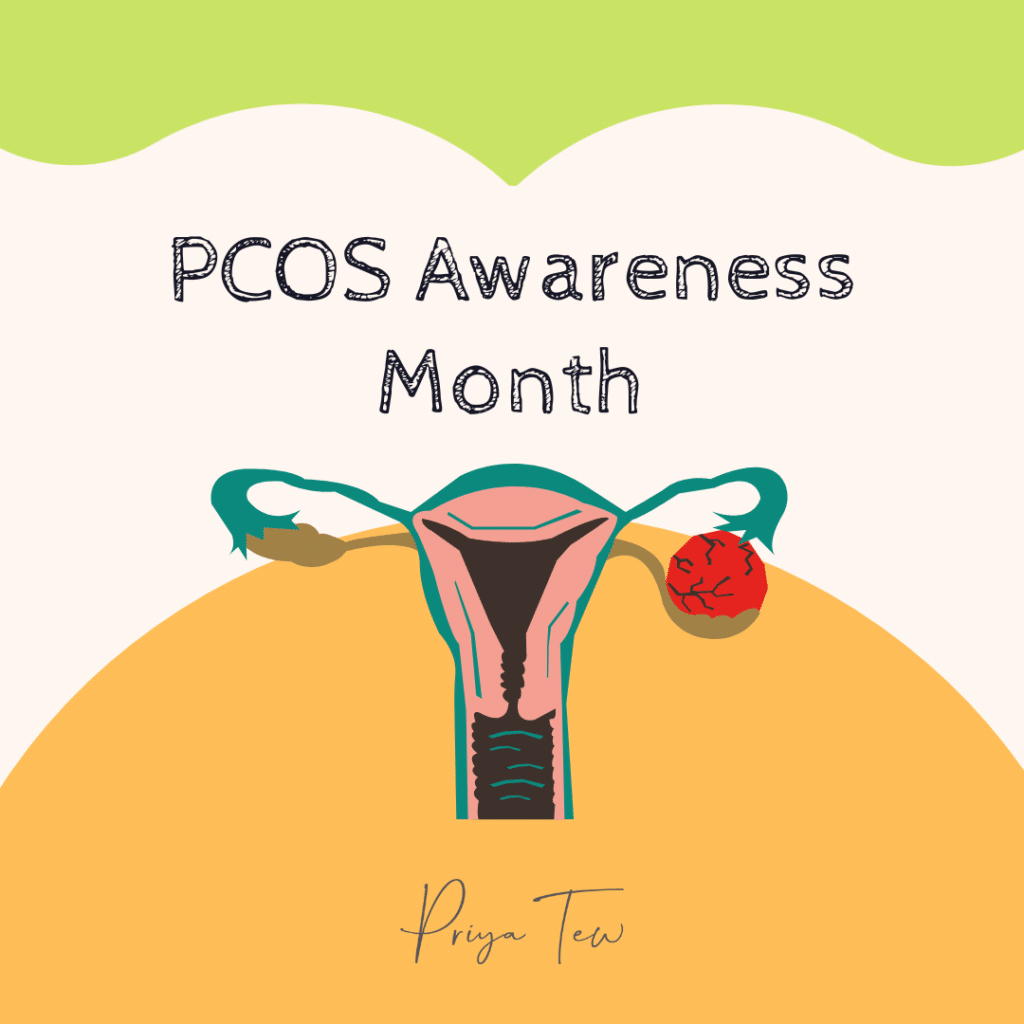This month is PCOS Awareness Month, so here we talk about the symptoms of PCOS, and how to get help. Whilst this can help you think about “Do I have PCOS” this blog is not a substitute for medical advice.
PCOS, or Polycystic Ovary Syndrome, is a disorder of the reproductive and metabolic systems. It affects between 1 in 5 and 1 in 10 women and AFAB people. Because PCOS is a syndrome rather than disease, means that the condition is a collection of symptoms rather than a disease. This means that it can be hard to pin down exact symptoms and even causes from one person to the next.

Do I have PCOS?
PCOS is diagnosed by meeting at least 2/3 of the following (note you do not have to have all of these):
- Raised androgen hormones, (such as testosterone) measured in a hormone test, or symptoms of higher androgens, this can be seen with acne, hirsutism.
- Irregular or absent period – this is a sign of irregular or absent ovulation
- Polycystic ovaries viewed through an ultrasound scan, where there are more than 12 follicles on one ovary or the size of the ovaries are larger.
Types of PCOS:
- PCOS is sometimes categorised into these types, this isn’t a medical diagnostic criteria but it can help some people make more sense of how/why their PCOS developed:
- 1. Insulin Resistance: increased insulin levels are in the body, there can be a struggle with weight gain, fatigue, brain fog, excess hair growth. This is the most common type.
- 2. Adrenal PCOS: due to an abnormal stress response, excess androgens are released. Top tips are to focus on stress management, sleep routines, avoiding high intensity exercise and caffeine.
- 3. Inflammatory PCOS: after a period of chronic inflammation. Focusing on good nutrition for gut health can help.
- 4. Post-pill PCOS: can happen after stopping some contraceptive pills and is reversible with good lifestyle measures.
Want more? You can read more on the types of PCOS here.
Symptoms of PCOS:
Whilst there are different types of PCOS, there are, however, common symptoms that are key indicators of PCOS to be aware of:
- Acne or oily skin
- Hirsutism (excess hair) or male pattern baldness
- Irregular or absent periods
- Polycystic ovaries (shown with an ultrasound scan)

Although it is very possible to have these symptoms for a variety of reasons, if you recognise having multiple symptoms, it may be an indicator that you have PCOS.
Acne, oily skin, hirsutism and male pattern baldness are all indicators of raised androgens. Androgens are “male” hormones such as testosterone. Having one of these symptoms or a blood test showing raised androgens is one of the three criterion for diagnosing PCOS via the Rotterdam Criteria.
Irregular periods, known as oligomenorrhoea are another part of the Rotterdam Criteria. These can be a sign of the disrupted hormonal interactions and difficulty ovulating properly.
Polycystic ovaries are somewhat confusingly named as they refer to immature follicles (eggs) rather than ovarian cysts. When eggs fail to fully mature, they are not released from the ovaries, which can lead to a “string of pearls” appearance when viewed through an ultrasound. Although polycystic ovaries are considered to be the key hallmark of PCOS, it is possible to have polycystic ovaries without having PCOS.
Risk factors linked to PCOS
Due to the way that PCOS impacts the functioning of certain hormones, it is often associated with insulin resistance, difficulty maintaining weight and an increased risk of type 2 diabetes, cardiovascular disease and endometrial cancer. This is on top of PCOS being one of the most common causes of infertility.
PCOS is still not fully understood, which is why raising awareness is so crucial. Treatment includes dietary and lifestyle management, plus medication when needed. You may be prescribed Metformin to help with improve insulin sensitivity and menstrual cycle regularity. Working on your nutrition and your gut health is also a huge key. This is why working with your doctor and a nutrition specialist can be super helpful. There is lots of conflicting and often misleading advice online, so make sure to follow someone who has an appropriate qualification and doesn’t promise miracles.
Getting support
Elle is our specialist in PCOS and will give you evidence based, highly specialist advice, so for PCOS support, you can book in for a PCOS specialist virtual appointment here for nutritonal advice and support in helping get your symptoms under control.
There is lots of information on the internet, here’s a good resource on PCOS to read, however nothing replaces individual 1-1 advice.
Also take a look to see if there are any support groups near you run by Verity.